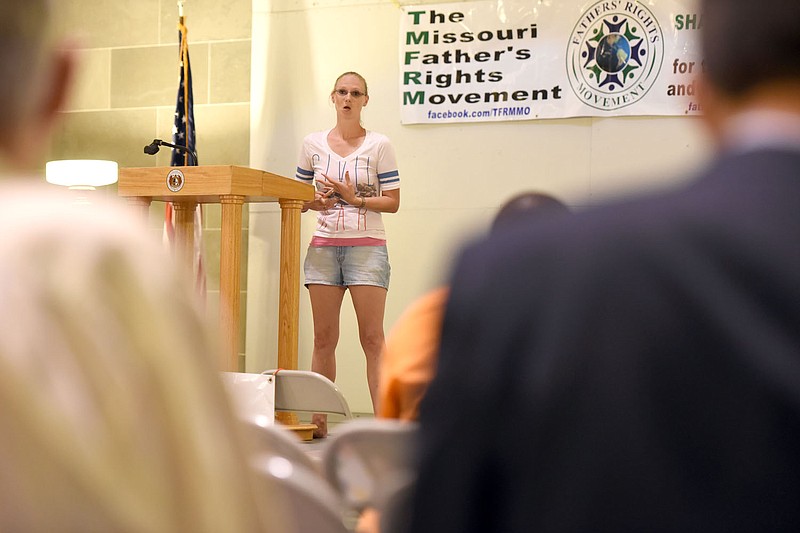Since Dontrell Thomas Sr. and his ex-wife divorced about five years ago, he has been gradually trying to gain more parenting time with his son, who is now 14.
He sees his son every other weekend, and those are his only overnight visits. Thomas, of St. Louis, filed for increased visitation to give he and his ex-wife equal time with their son.
"I expressed to the courts that I'm not a weekend dad," said Thomas, an operations manager at Boeing.
Thomas, fathers like him across the state and others impacted by custody cases joined together Friday inside the Missouri Capitol Rotunda. Each year on the Friday before Father's Day, advocates for father's rights convene to share their stories and messages.
They are hoping Gov. Jay Nixon will sign a bill to alleviate their woes. The legislation supports shared parenting, or 50/50 parenting, to allow each parent similar amounts of time with their children. It also stipulates judges cannot express gender bias in custody cases.
"I believe this bill will, if not help my particular case, help other parents who are denied the (opportunity) to have equal, 50/50 consideration with their children," Thomas said. "I think it starts to level the playing field with the courts and removes some of the litigation that is both time consuming and costly to those involved. It also lessens the adverse impact on the child in getting caught up in a custody battle."
The legislation passed unanimously in the Senate and only received two dissenting votes in the House. Linda Reutzel, a member of the National Parents Organization of Missouri, said the bipartisan support shows the overwhelming need for this bill to become law.
"It's a mandate from our legislators telling judges and lawyers that our family court is not doing what is in the best interest of the children," she said. "Children need and want equal access to both fit and willing parents."
Judges still maintain discretion, but the legislation will eliminate the default parenting plan issued when two parties cannot reach a custody agreement - one day a week and every other weekend for the father.
Reutzel's son received a default parenting plan when he divorced his wife, she said. During the couple's separation, there was a 50/50 parenting plan, but when the time came for court, the mother changed her mind.
"When one party - and it's usually the mother - knows if she doesn't agree to 50/50 that she will get the bulk of the parenting time, what is to bring her to the table?" Reutzel said. "That is our system, and I'm not blaming anybody but the system."
Fathers seeking more parenting time can find the process timely and expensive. Thomas' battle has lasted more than a year and cost him more than $10,000 in attorney fees. However, he said, his son is the real victim in this case.
"There's pain on both sides going through this process," he said.
Philip Canole, of Bolivar, said justice has come at a price for him. He sees his two teenage children every other weekend and on Wednesdays after school until 9 p.m. during the school year. Canole has them for two weeks each in June, July and August. The custody agreement was difficult to reach, he said, and now it's hard to enforce.
"You're not a visitor. You've been their father and you've raised them from birth, but as soon as you get divorced - you're a visitor," he said. "It's like you're someone they don't know meeting them with a name badge on. That's crazy."
Reutzel said children whose parents practice shared parenting tend to have healthy relationships with both, don't feel abandoned by either, feel loved continuously and have opportunities to spend time with extended family.
If Nixon signs the bill, their fight is not over, she said. Advocates will monitor how judges and lawyers respond to the legislation but will continue raising awareness no matter the outcome.
"The law sounds good, but we still need to educate the judges and lawyers about what's in the best interest of the children," Reutzel said. "We have to bring them over because they still have discretion."

